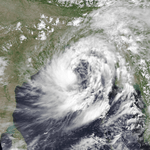1985 North Indian Ocean cyclone season
| 1985 North Indian Ocean cyclone season | |
|---|---|
|
Season summary map | |
| Seasonal boundaries | |
| First system formed | January 7, 1985 |
| Last system dissipated | November 11, 1985 |
| Seasonal statistics | |
| Cyclonic storms | 6 |
| Total fatalities | Unknown |
| Total damage | Unknown |
| Related articles | |
The 1985 North Indian Ocean cyclone season was part of the annual cycle of tropical cyclone formation. The season has no official bounds but cyclones tend to form between April and December. These dates conventionally delimit the period of each year when most tropical cyclones form in the northern Indian Ocean. There are two main seas in the North Indian Ocean—the Bay of Bengal to the east of the Indian subcontinent and the Arabian Sea to the west of India. The official Regional Specialized Meteorological Centre in this basin is the India Meteorological Department (IMD), while the Joint Typhoon Warning Center (JTWC) releases unofficial advisories. An average of five tropical cyclones form in the North Indian Ocean every season with peaks in May and November.[1] Cyclones occurring between the meridians 45°E and 100°E are included in the season by the IMD.[2]
Systems
Tropical Storm One (1B)
| Tropical storm (SSHWS) | |
  | |
| Duration | May 22 – May 25 |
|---|---|
| Peak intensity | 110 km/h (70 mph) (1-min) 979 hPa (mbar) |
Tropical Storm One, which developed in the central Bay of Bengal on May 22, strengthened to a peak of 70 mph winds before hitting Bangladesh on the 25th. The storm brought torrential rains and flooding, killing around 11,069 people[3] and leaving hundreds of thousands homeless. Advance warning likely cut back on what could have been a much higher death toll.
Tropical Storm Two (2A)
| Tropical storm (SSHWS) | |
 | |
| Duration | May 28 – June 1 |
|---|---|
| Peak intensity | 95 km/h (60 mph) (1-min) 987 hPa (mbar) |
A tropical depression formed in the central Arabian Sea on May 28. It headed northward, reaching a peak of 60 mph winds before hitting western India on the 31st. The storm dissipated on the 1st.
Tropical Storm Three (3B)
| Tropical storm (SSHWS) | |
  | |
| Duration | October 8 – October 11 |
|---|---|
| Peak intensity | 95 km/h (60 mph) (1-min) 988 hPa (mbar) |
Tropical Storm Three, which developed in the central Bay of Bengal, moved northwestward to hit India on the 11th as a 60 mph storm.
Tropical Storm Four (4B)
| Tropical storm (SSHWS) | |
  | |
| Duration | October 15 – October 16 |
|---|---|
| Peak intensity | 95 km/h (60 mph) (1-min) 987 hPa (mbar) |
Tropical Cyclone 04B had a long life. It was first detected on 9 October, almost a week before the initial warning was issued,as an area of poorly organized convection in the South China Sea. The Tropical Disturbance was developing in the active monsoon trough, midway between Tropical Cyclone 03B in the Bay of Bengal, and a disturbance in the Philippine Sea that would soon develop into Typhoon Cecil. 38 people were killed when 60 mph Tropical Storm Four hit the northeastern coast of India on October 16.
Tropical Storm Five (5B)
| Tropical storm (SSHWS) | |
  | |
| Duration | November 13 – November 18 |
|---|---|
| Peak intensity | 100 km/h (65 mph) (1-min) 983 hPa (mbar) |
On November 17, 65 mph Tropical Storm Five, which developed on the 13th, hit eastern India. The storm brought heavy flooding, but no damage or deaths were reported.
Tropical Storm Six (6B)
| Tropical storm (SSHWS) | |
  | |
| Duration | December 9 – December 14 |
|---|---|
| Peak intensity | 95 km/h (60 mph) (1-min) 987 hPa (mbar) |
50 mph Tropical Storm Six, having developed on December 9, hit southeastern India on the 13th.
See also
- List of North Indian Ocean cyclone seasons
- 1985 Atlantic hurricane season
- 1985 Pacific hurricane season
- 1985 Pacific typhoon season
- Australian cyclone seasons: 1984–85, 1985–86
- South Pacific cyclone seasons: 1984–85, 1985–86
- South-West Indian Ocean cyclone seasons: 1984–85, 1985–86
References
- ↑ "Frequently Asked Questions: What is the annual frequency of Cyclones over the Indian Seas? What is its intra-annual variation?". Indian Meteorological Department. 2012. Archived from the original on May 21, 2015. Retrieved June 8, 2012.
- ↑ "Bulletins Issued by Regional Specialized Meteorological Centre (RSMC) - Tropical Cyclones, New Delhi" (PDF). India Meteorological Department. May 25, 2009. Retrieved July 16, 2012.
- ↑ Rahman Khan, Sirajur. "CYCLONE HAZARD IN BANGLADESH" (PDF). ADPC.net. Retrieved 4 December 2015.
